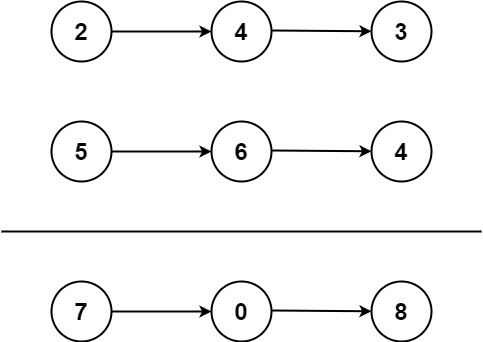2. Add Two Numbers
1. Description
You are given two non-empty linked lists representing two non-negative integers. The digits are stored in reverse order, and each of their nodes contains a single digit. Add the two numbers and return the sum as a linked list.
You may assume the two numbers do not contain any leading zero, except the number 0 itself.
2. Example
Example 1

Input: l1 = [2,4,3], l2 = [5,6,4]
Output: [7,0,8]
Explanation: 342 + 465 = 807.
Example 2
Input: l1 = [0], l2 = [0]
Output: [0]
Example 3
Input: l1 = [9,9,9,9,9,9,9], l2 = [9,9,9,9]
Output: [8,9,9,9,0,0,0,1]
3. Constraints
- The number of nodes in each linked list is in the range [1, 100].
- 0 <= Node.val <= 9
- It is guaranteed that the list represents a number that does not have leading zeros.
4. Solutions
Linked List
n = max(len(l1), len(l2))
Time complexity: O(n)
Space complexity: O(1)
class Solution {
public:
ListNode *addTwoNumbers(ListNode *l1, ListNode *l2) {
ListNode dummy = ListNode();
ListNode *tail = &dummy;
int carry = 0;
while (l1 != nullptr || l2 != nullptr || carry != 0) {
int sum = carry;
if (l1 != nullptr) {
sum += l1->val;
l1 = l1->next;
}
if (l2 != nullptr) {
sum += l2->val;
l2 = l2->next;
}
carry = sum / 10;
tail->next = new ListNode(sum % 10);
tail = tail->next;
}
return dummy.next;
}
};